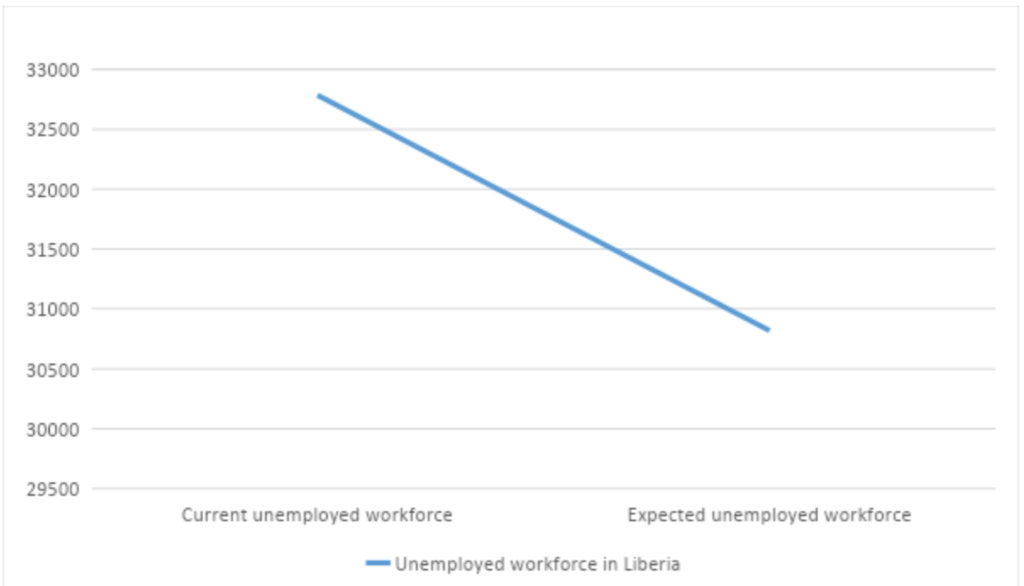Why privatizing Liberia’s economy is important
By Mengistu Eddie Wolokollie

Liberia is a West-African developing country that has a difficult economic situation related to political instability and conflicts that occurred in the past. Since 1980, Liberia was torn by inner conflicts, because of the coup against President William R. Tolbert. The government policy led by this president was rather ineffective and resulted in the increased price of rice. Subsequently, leading the country into mass and violent protest (Werker & Beganovic, 2011). During these protests, William Tolbert was executed, and Samuel Doe, who was an old Master Sergeant of the Liberian Army, seized power.
Unfortunately, things took a turn for the worse when the rebel warlord Charles Taylor dragged Liberia into a 14-year war. (Werker & Beganovic, 2011). The situation became relatively stable by 2003 after the United Nations Mission began in Liberia. In 2017, Liberia became a democratic state after the Liberian general election. Still, due to decades of wars, conflicts, and crimes, Liberia’s economy suffered a devastating impact. There is a need to implement radical reforms to address the needs of this developing country and to ensure that Liberia will achieve sustainable economic growth and stability.
Privatization is one of the most effective ways to transform the economy and achieve economic growth. Events that took place in the past indicate that governments who have full control over the economy are ineffective and unable to achieve high economic stability and growth. Numerous examples show planned or administrative command economies are not effective in the modern world. The brightest example is USSR and China, which were dominated by communist regimes. In the 20 th century, the economies of these countries were controlled by their government, which resulted in mass starvation, poverty, and many other social and economic problems. This is because the government cannot effectively develop all the industries and economic sectors. The government is unable to regulate supply effectively to satisfy the demand of potential customers. That is why the quality of products produced in the USSR and China before privatization was rather low. In the case of the USSR, the planned economy resulted in the dissolution of this state and created huge economic problems that the Russian Federation had to overcome for decades. Hence, after China has implemented radical changes in the economy and implemented strategies focused on privatization, its economic growth significantly accelerated. China has one of the most developed economies in the world. Nowadays, products produced in China are sold all over the world, and their quality is constantly rising. The same thing happened to the Russian Federation, which was able to improve the economic condition by privatizing government-owned sectors of the economy. Hence, Liberia should follow examples of these countries, and use privatization as one of the main means of transforming the economy.
Several factors make privatization successful. Firstly, in the market economy, everything is driven by the quality of products and services provided, as well as by demand and supply. Privately held companies exist in a highly competitive environment, which encourages them to produce products of a higher quality compared to their competitors. Privatization results in increased quality of products and services provided and ensures that supple will satisfy the demand. On the contrary, government-owned companies usually provide services and products of poor quality (Nellis, 2007).
Furthermore, if a privately held company fails to generate profits, because of the low quality of products, it becomes bankrupt. On the contrary, government-owned companies are constantly supported by subsidies from the government, which keeps them afloat. Even if a government-owned company is unprofitable, it will continue to exist because of constant money inflows from the government. These money inflows are obtained from taxpayers’ money, which negatively contributes to the economy in general. Saved taxpayers’ money can be used to improve the quality of life of people and stimulate the development of the economy, especially in developed countries. Therefore, privatization ensures that companies will strive towards providing a higher quality of services and products to the customers.
Furthermore, privately held companies are stimulated towards earning as much money as possible, which creates additional workplaces. This is especially important for Liberia, which has high unemployment rates. According to the World Bank, numerous examples are showing unemployment rates in Liberia are about 2% (2019). The total number of the labor force in Liberia is 1.639.258 people, which means that about 32.785 people are currently unemployed. Privatization can significantly reduce unemployment rates and provide people with workplaces with higher average wages (Earle, 2014).
Interestingly, foreign privatization usually results in higher productivity and cost effects compared to domestic privatization, especially in developing countries (Earle, 2014). This is because foreign investors that enter markets of developing countries provide better technologies and organize business processes more effectively than domestic ones. However, domestic investors will be able to increase the quality of services provided because of competition with foreign investors. Unfortunately, there is not much data available on the effects of privatization on employment; still, the vast majority of studies indicate that privatization increases employment rates in developing countries (Earle, 2014).
Of course, there are risks associated with privatization, which can result in higher unemployment rates. This is because in countries with high corruption may provide privileged rights for privatization for oligarchs and people owning huge capitals. As a result, there is a risk that many companies who were previously owned by the government, will be controlled by several wealthiest people. As a result, the wealthiest minority can control certain sectors of the economy. This can lead to a monopolization of the economy. Hence, there is a risk that monopolies won’t have any competitors, and they won’t improve the quality of services and products provided. Therefore, Liberia should use Initial Public Offering (IPOs) to ensure that privatization will be done properly and fairly. Still, if privatization is implemented correctly and effectively, it will spur economic growth and reduce unemployment. Hence, it can be expected that unemployment rates in Liberia will drop significantly. Studies indicate that firms after privatization can increase employment by an average of 6% (Kikeri, 1998). Thus, it can be expected that the unemployment rate in Liberia will decrease by up to 6%. Unemployment rates will drop from 2% to 1.88%. In the long-term perspective, unemployment rates can drop even further, depending on the effectiveness of privatization strategies used.

Privatization allows streamlining and downsizing government. In other words, it will save financial resources on maintaining an ineffective government structure and will help to get rid of unnecessary or poor performing processes. It will also help to save taxpayers money, and ensure that governmental structure perfectly aligns with the needs of the market and needs of Liberian people. Privatization will result in the restructuring of the Liberian government and will make it more effective.
Another positive effect of privatization is that it increases the innovation and efficiency of companies. As was mentioned, in a highly competitive environment, privately held companies have to constantly develop new strategies and implement innovations in businesses to achieve a competitive advantage. Innovation will help businesses existing in Liberia to become competitive in the global economy; hence many products and services created in Liberia can be exported to other countries. Innovations can significantly improve the efficiency of labor and contribute to the growth of GDP and other economic indicators.
Furthermore, the task of every effective government is to steer and to row. It means that the government should make policy but utilize other actors to deliver public services (Peters, 2011). The traditional forms of government are focus on involving strict hierarchy, command and control, authority, and other strategies that are rather outdated and ineffective. If the government controls everything, it creates inflexibility and doesn’t allow companies to meet the needs of potential customers and satisfy their needs. Strict, inflexible governance is often observed in totalitarian non-democratic societies. Hence, such societies have high levels of bureaucracy and corruption. Privatization will provide businesses with more freedom and flexibility, which will ultimately contribute to customer satisfaction and economic growth. It is needed to involve private actors in implementing decisions instead of improving the efficiency of administrative programs (Peters, 2011). Liberia is transforming into a modern democratic state; hence there is an obvious need to reduce government control over various sectors of the economy and to allow people to participate in the development of this country actively.
In some cases, the government may use meta-governance, which means that the government can manage certain aspects of public organizations and programs; however, no direct control should be imposed (Peters, 2011). The steer not to row strategy allows the government to save more time than was previously spent to manage personnel and reduces bureaucracy in general hence after the Liberian privatization government becomes more effective.
The examples listed above clearly indicate that privatization is essential for the economy of Liberia. There is no need to resist privatization. The most effective economies in the world, including the U.S., China, and the European Union implemented privatization a long time ago, and now they enjoy numerous benefits provided by it. Liberia should learn from mistakes made by other countries during the process of privatization and should use effective monitoring to ensure that privatization won’t cause any harm to the economy. In recent years Liberia economy has shown quite good results, and such economic indicators as employment rate, GDP, and human capital index are constantly growing. The main task of the government is to implement effective economic reforms and maintain this positive tendency. Radical reforms and privatization will attract many foreign investors, which will stimulate the economy of Liberia. Ultimately, people of Liberia will enjoy the benefits of privatization, and their quality of life will increase.
References
Earle, J. S. (2014). Impact of privatization on employment and earnings. IZA World of Labor.
Kikeri, S. (1998). Privatization and labor: what happens to workers when governments divest?. The World Bank.
Nellis, J. R. (2007). Privatization in developing countries: a summary assessment. SAIS Review of International Affairs, 27(2), 3-29.
Peters, B. G. (2011). Steering, rowing, drifting, or sinking? Changing patterns of governance. Urban Research & Practice, 4(1), 5-12.
The World Bank (2019). International Labour Organization, ILOSTAT database. Data retrieved in December 2019.
Werker, E., & Beganovic, J. (2011, June). Liberia: a case study. In International Growth Center Workshop on “Growth in Fragile States.”

